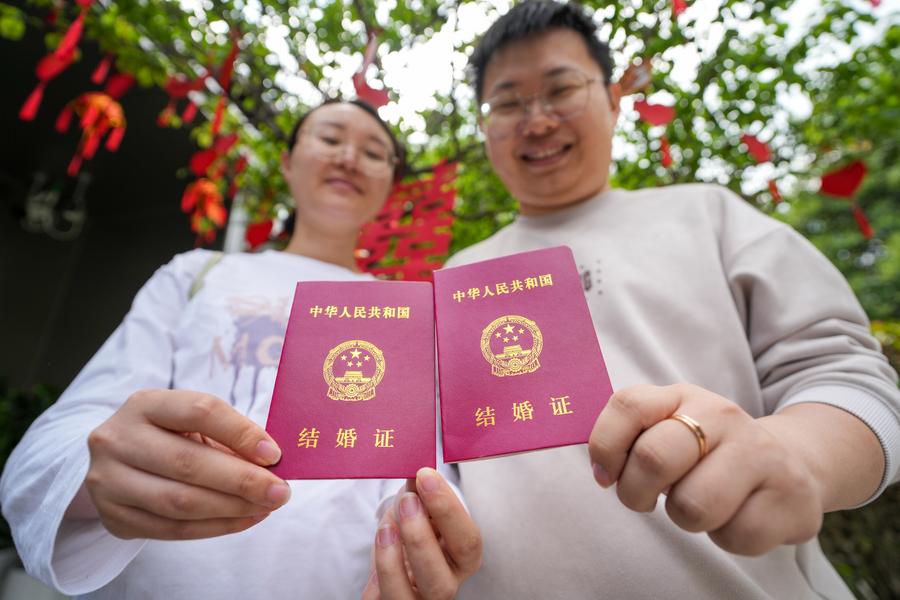More Chinese provinces extend marriage leave in family support push


BEIJING -- China is rolling out extended marriage leave in at least 27 provincial-level regions as part of ongoing efforts to foster a more family-friendly society.
The government of Sichuan province, one of the country's most populous regions, has unveiled a plan to extend marriage leave from three to 20 days, with an additional five days for those who opt for a premarital medical checkup.
The proposal is currently open for public comment throughout June.
"Previously, with only three days off, it could be a challenge to get home for a wedding itself -- forget about a honeymoon!" said Wang Mengdi, an employee at a Sichuan-based human resources firm. "But with 25 days, you have ample time to enjoy a decent honeymoon."
Shandong province in East China, the ancestral home of Confucius, with a permanent population exceeding 100 million, further reinforced its cultural emphasis on family bonds by extending marriage leave from three days to a maximum of 18 days through legislative action in January.
Currently, China grants newlyweds a three-day marriage leave at the national level, a tradition that dates back to 1980.
"The one- to three-day marriage leave can barely meet the needs of today's young couple for wedding preparation and ceremonies. This has even impacted marriage registration and fertility rates to some extent," said Xu Jinmei, a senior legislator in Shandong.
Amid rapid industrialization and urbanization, millions of young adults have migrated from their hometowns in pursuit of education and career opportunities. Despite this mobility, the deeply rooted tradition of returning home for wedding celebrations remains strong.
The custom requires substantial time investments, as many must travel a long way back home to hold their weddings.
Provincial-level regions in China have the autonomy to determine the length of marriage leave, often influenced by local customs and demographic policies. The provinces of Shanxi and Gansu offer the most generous policies, allowing up to 30 days of paid leave for newlyweds.
The incentive measures were rolled out amid marriage registration declines in China. Official data show that 1.81 million couples registered to tie the knot in the first quarter of 2025, down 8 percent year on year. After a brief rebound in 2023, registrations fell again last year, reaching the lowest level since 1980.
Scholars attribute the drop to several factors, including a shrinking pool of marriage-age adults and waning enthusiasm for matrimony.
"In the 1980s, more than 20 million people were born each year in China. But since 2000, that number has dropped to just over 10 million annually. So naturally, the base number for marriage registrations is much lower now," said Jiang Quanbao, a professor at the institute for population and development studies at Xi'an Jiaotong University.
Li Ting, a demographer at Renmin University of China in Beijing, noted that higher levels of education and a growing sense of individualism have combined to significantly challenge traditional views on marriage.
"In the past, young people got married around the time they graduated or started working, but now many won't consider marriage until they're planning to have children," Li added.
In a country where the traditional belief is that marriage should precede childbearing, declining marriage rates have become one of the factors behind falling birth rates.
In response to these challenges, authorities across the country have introduced various measures to foster a newlywed-friendly society.
China streamlined marriage registration. Since May, couples have been able to register their marriage anywhere in the country without presenting a household registration booklet.
Local authorities have also extended maternity leave and paternity care leave to support family planning.
However, some worry that extended marriage leave, maternity leave, and other benefits could end up becoming empty promises due to the economic pressures faced by enterprises.
Zhai Zhenwu, president of the China Population Association, noted that the overall extension of marriage leave and maternity leave is not that costly. "This should not be a barrier to extending maternity leave," he said.
Zhai also proposed that local budgets help enterprises to offset some of the costs of maternity and marriage leave policies.
The suggestion appears to have resonated with policymakers, as reflected in the draft policy statement from Sichuan provincial authorities.
The policy document open for public consultation noted that governments at or above the county level should coordinate multi-channel funding to establish a reasonable cost-sharing mechanism for marriage and parental leave, striving to guarantee the full implementation of the leave.
- More Chinese provinces extend marriage leave in family support push
- World's first wind-powered commercial underwater data center project launched in Shanghai
- Chinese, Israeli scientists develop new approach to make large-scale genetic editing
- China's AG600 aircraft greenlighted for mass production
- Hong Kong to release 2025 policy address ahead of schedule in Sept: HKSAR chief executive
- China set to build future workforce with new tech-centric college majors





































